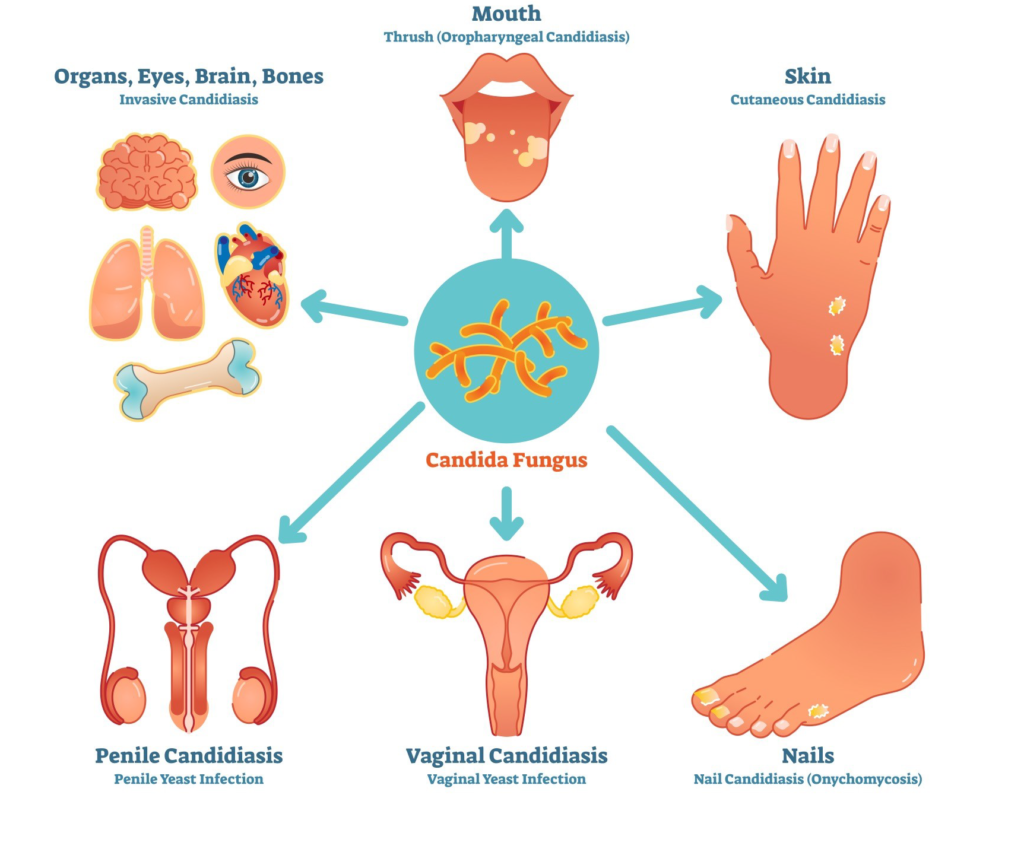Don’t let Candida Overgrowth hold you back any longer. Get the facts, and learn how to recognize and treat this common condition for optimal health.
Disclaimer
The content on this website is intended for informational purposes only, and is not a substitute for professional medical advice, diagnosis, or treatment. Discuss any information from this website with a qualified healthcare provider or licensed medical professional to determine its relevance and suitability for your individual health needs.
If you’ve been feeling constantly exhausted, have stomach issues, persistent skin issues, foggy thinking, or unexplainable body aches and pains, think of Candida Overgrowth as a potential culprit.
If overlooked and left untreated, this condition can spread to other parts of the body, showing up through a variety of other nonspecific symptoms in addition to the ones already mentioned. If overlooked and left untreated, this condition can spread to other parts of the body, showing up through a range of other nonspecific symptoms in addition to the ones listed above.
In this comprehensive guide, we will explore candida overgrowth, its causes and symptoms, how it’s diagnosed and treated, and tips for prevention.
What is Candida Overgrowth?
Candida is a type of yeast that naturally lives in our bodies, specifically in the mouth, gut, on the skin, and vagina and anus.
In normal amounts, it’s harmless and even helps with digestion and nutrient absorption. However, when the balance is disrupted, and Candida populations expand excessively, it can lead to overgrowth, causing a wide range of symptoms and health problems.
This imbalance often develops when the environment inside the body changes in a way that encourages yeast growth. Factors such as a weakened immune system, certain diets, high stress levels, and the use of antibiotics can contribute to its proliferation.
Symptoms

Credit: iStock
Candida overgrowth can manifest in various forms, depending on the affected area of the body. Some common symptoms include:
- Vaginal Infections: Also known as vaginal candidiasis, symptoms include itching, redness, and a thick, white discharge.
- Oral Thrush: Visible as white patches on the tongue or inside the cheeks, sometimes accompanied by soreness and difficulty swallowing.
- Digestive Issues: Bloating, constipation, or diarrhoea can occur alongside persistent gastrointestinal distress.
- Chronic Fatigue: Sufferers may experience tiredness that doesn’t improve with sleep, often paired with muscle or joint pain.
- Skin and Nail Conditions: Candida overgrowth can lead to fungal skin infections and nail bed infections.
- Brain Fog: Difficulty concentrating, poor memory, and a lack of focus are common cognitive complaints.
Causes
One of the primary triggers for Candida overgrowth is the use of antibiotics. Antibiotics are designed to kill bacteria that cause infections. Unfortunately, they do not discriminate between ‘bad’ and ‘good’ bacteria, often eliminating the beneficial bacteria in the gut. This disruption in the microbial balance can create an opportunity for Candida to thrive.
Other factors contributing to Candida overgrowth include:
- Weak Immune System: A vulnerability that makes you an easy target for Candida.
- High-Sugar Diets: Candida yeasts feed on sugar, thus high-sugar diets can encourage their growth.
- Chronic Stress: Long-term stress can weaken the immune system and disrupt the balance of microorganisms in the body.
- Oral Contraceptives: Some studies suggest a link between the hormonal changes caused by oral contraceptives and increased Candida growth.
- Diabetes: People with diabetes, especially if poorly controlled, have higher sugar levels in their mucous membranes, which can promote the growth of Candida.
Click here to explore more about Diabetes, including its types, organs involved, causes, and effects on health.
Diagnostic Tests

Credit: iStock
Suspecting you might have an overgrowth of Candida, your doctor may use any of the following tests to detect it.
-
Looking Closely
The first step usually involves the doctor examining the areas where you’re experiencing symptoms, such as the mouth, skin, or genital areas.
-
Blood Tests
A few different blood tests can help indicate if your body is fighting off a surplus of Candida by detecting:
- Complete Blood Count (CBC): To check for signs of infection.
- Candida Antibodies Test: Measures levels of IgG, IgA, and IgM antibodies against Candida in the blood.
- Beta-D-Glucan Test: This test can detect fungal infections, including those caused by Candida species, by identifying a fungal cell wall component in the blood.
-
Stool Tests
A stool test can detect Candida in the digestive tract. It may also assess the overall balance of bacteria and yeasts in the gut, which could indicate dysbiosis. This imbalance may favor Candida’s overgrowth.
-
Urine Tests
This test searches for a byproduct of Candida growth in your urine, suggesting overgrowth in your intestines or urinary tract.
-
Oral Swab
If oral thrush (a Candida infection in the mouth) is suspected, a swab from your mouth can be taken for closer examination or to be cultured in a lab to confirm Candida’s presence.
-
Vaginal Sampling
In women showing signs of a yeast infection, a sample of vaginal discharge may be examined under a microscope or cultured to identify the presence and amount of Candida.
-
Skin or Nail Sampling
A small sample can be collected for microscopic examination or culture to detect Candida for suspected skin or nail yeast infections.
Even though these tests can identify the presence of Candida, finding it doesn’t always mean that it’s problematic or the source of your symptoms. Candida is a common component of our body’s microbiota, but its presence alone is not enough. It’s overgrowth that can lead to issues.
Doctors will look at test results, alongside your symptoms and medical history to determine whether Candida overgrowth is negatively affecting your health.
Managing & Treating Candida Overgrowth
-
Eating Right
One of the first steps to get Candida under control is watching your sugar intake because Candida loves sugar. Adding foods or supplements that contain probiotics (these are good bacteria) can also be a big help in bringing back a healthy balance to your gut.
-
Using Medications
Sometimes, doctors might suggest using antifungal medications. These are special medicines that help stop the yeast from growing too much. It’s really important to use these exactly as your doctor tells you to.
-
Making Lifestyle Changes
Stress doesn’t do your body any favours, especially when you’re battling Candida. Stress-reduction techniques like mindfulness, meditation, or even regular exercise can boost your immune system, making it easier for your body to keep Candida in check.
-
Non-Medical treatment
There are a number of non-medical treatment strategies that can be used to control Candida overgrowth. Supplements containing beneficial bacteria and yeasts, known as probiotics and prebiotics, help replace good bacteria in the gut, improve the function of the gut’s barrier, and compete with harmful fungi. Natural antifungal substances that can directly fight fungal overgrowth include garlic, cinnamon, lemongrass, coconut oil, ginger, seaweed, thyme, olive oil, fermented vegetables, apple cider vinegar, and yoghurt.
-
Seeing Your Doctor Regularly
If Candida keeps coming back or if you have other health issues that make you more likely to get it, keeping in touch with your doctor can make a big difference. Regular visits allow your doctor to keep an eye on things, and adjust your treatment plan as needed.
FAQs
-
How long does it take to get rid of Candida overgrowth?
The time frame can vary from person to person, depending on the severity of the overgrowth, the chosen treatment plan, and individual lifestyle factors. Some may see improvements within a few weeks, while others might need a longer duration for noticeable changes.
-
Can Candida overgrowth go away on its own?
Candida overgrowth is unlikely to resolve itself without addressing the underlying causes and making necessary lifestyle and dietary changes. In some cases, medication might be required.
-
Is Candida overgrowth contagious?
Candida overgrowth itself isn’t contagious, but certain conditions it causes, like oral thrush and vaginal yeast infections, can be spread to others.
-
Can men get Candida overgrowth, or is it only a female issue?
Candida overgrowth can affect anyone, regardless of gender. While women may more frequently develop vaginal yeast infections, men can also experience overgrowth, leading to skin, nail, and oral diseases.
-
Will I need to avoid all sugars forever to prevent Candida overgrowth?
Not necessarily forever, but reducing your intake of high-sugar foods and refined carbohydrates is a good practice for managing and preventing Candida overgrowth. Your healthcare provider can offer guidance on a balanced diet that supports your overall health.
Further Readings
For more detailed information, consult these resources or speak to your doctor.
- https://www.ncbi.nlm.nih.gov/books/NBK560624/
- https://www.healthdirect.gov.au/vaginal-thrush
- https://medlineplus.gov/yeastinfections.html
- https://www.ncbi.nlm.nih.gov/pmc/articles/PMC10302699/
- https://www.cdc.gov/fungal/diseases/candidiasis/invasive/treatment.html






